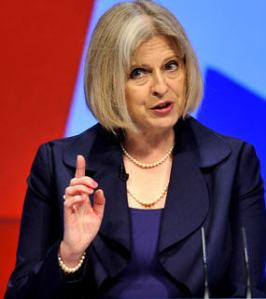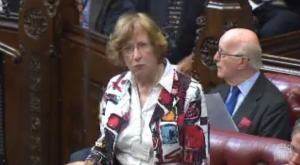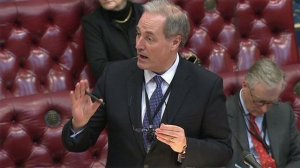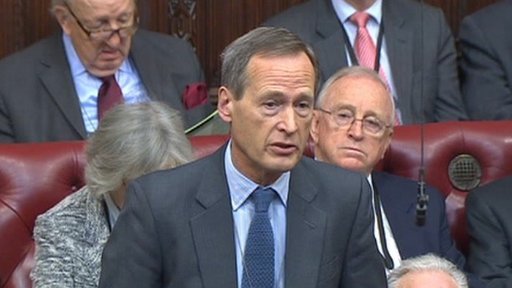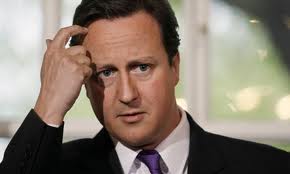Posts Tagged ‘ACMD’
Professor Les Iversen, Tightrope Walker and Unsung Hero of Cannabis Law Reform
Leslie Iversen, born October 31 1937, died July 30 2020
Daily Telegraph obituary ‘Leslie Iversen, pioneering neuroscientist who studied the effects of drugs on the brain’
I’m sad that the latter years of Les Iversen’s life have been skipped over in this obituary. As with so many scientists who have had some influence in the political field, he had to tread a tightrope between scientific evidence and the ignorance, bigotry, prejudice of those in politics who are far more concerned with tabloid headlines than facts.
His chairmanship of the ACMD was conducted with great skill and enormous patience as politicians took decisions which were diametrically opposed to evidence. If Les had had his way, the medicinal benefits of cannabis would have been acknowledged far sooner and his knowledge would have cut through the vested interests of senior clinicians which are currently stalling progress on uptake of this most valuable medicine.
Les was appointed chair of ACMD following the disgraceful sacking of David Nutt who had the temerity to tell government the facts about relative drug harms. Les was less of an abrasive character than David Nutt although their professional opinions on government drugs policy were closely aligned. He continued to speak truth to power and, as he told me many times, was completely frustrated by politicians’ attitude to cannabis and their preference for the Daily Mail’s guidance on drugs policy rather than science.
From 2010, as the campaign for cannabis law reform became far more professional and began to attract support from more and more backbench MPs, it was immensely valuable to have someone who was strong and certain in advising ministers of the facts, even if they chose not to act on them. He must take a huge amount of credit for the legalisation of medicinal cannabis in 2018. He was immensely skilful at remaining in post in order to provide the best advice while actually telling ministers that their polices were foolish. He has never received the recognition for this that he is due.
Today’s ACMD is supine in comparison, crippled by legislation which has effectively castrated it and turned it into a committee that will confirm whatever the Home Secretary of the day requires. Scientists and clinicians, more than ever, are controlled by the big businesses and fat cats who want to determine drugs policy based on self-interest and prejudice rather than science. Les was one of the last of the noble breed of scientists who told the truth without fear or an overriding concern for their bank balance.
Another Pack Of Lies On Cannabis From The UK Government.
Yet another cannabis petition amongst hundreds of similar pleas was filed earlier this autumn. This one though is more tightly focused on removing cannabis from schedule 1, which defines it as having no medicinal value. The petition is also commendably concise but characterises itself as a ‘demand‘ that cannabis be rescheduled, an unfortunate choice of words.
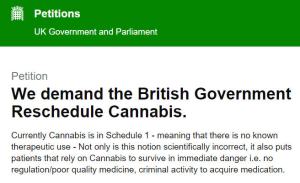 Nevertheless, congratulations are due in that it has exceeded the threshold of 10,000 signatures which means the government must respond. That response is now in and it is predictably dishonest, dismissive and authoritarian in its tone. The Home Office has responsibility for drugs policy so it has drafted the response but it surely must have consulted with the Department of Health.
Nevertheless, congratulations are due in that it has exceeded the threshold of 10,000 signatures which means the government must respond. That response is now in and it is predictably dishonest, dismissive and authoritarian in its tone. The Home Office has responsibility for drugs policy so it has drafted the response but it surely must have consulted with the Department of Health.
In fact, I was told only this week by a senior minister that “… the search into the medicinal use of cannabis is something that falls within the jurisdiction of the Department of Health.” That may be a subtle shift in policy from which we can draw some hope. But I fear that the response to this petition offers no hope at all. It is stubborn, obstinate, inaccurate and in denial of evidence and experience.
To be clear, the Home Office has been systematically lying and misleading the British people about cannabis for at least 50 years. The Department of Health is timid on the issue, leaves the public statements to the Home Office heavies and seems more interested in generating fee income for the Medicines and Healthcare products Regulatory Agency (MHRA), than in actually treating patients effectively.
I analyse the response paragraph by paragraph.
“Herbal cannabis is listed in Schedule 1 as a drug with no recognised medicinal uses outside research. A substantial body of scientific evidence shows it is harmful and can damage human health.”
By far the majority of scientists and doctors now recognise that cannabis has real and significant medicinal uses. Of course it is possible that cannabis can cause harm, as can any substance. However, there is no scientific evidence that shows cannabis as being any more harmful than over-the-counter medicines or many common foods. Professor Les Iversen, chair of the Advisory Council on the Misuse of Drugs, is on the record saying: “cannabis is a safer drug than aspirin and can be used long term without serious side effects”.
“The Government will not encourage the use of a Schedule 1 controlled drug based on anecdotal evidence. It is important that a medicine is very thoroughly trialled to ensure it meets rigorous standards before being licensed and placed on the market so that doctors and patients are sure of its efficacy and safety. “
It is not the government’s role to encourage the use of any drug as medicine, that is the role of a doctor. Only by removing cannabis from schedule 1 can that decision be placed in doctors’ hands. There is a vast quantity of peer-reviewed, published scientific evidence on the medicinal use of cannabis including human clinical trials. It is false to suggest that only anecdotal evidence is available. See ‘Medicinal Cannabis: The Evidence’. Thousands of doctors and millions of patients are sure of the efficacy and safety of cannabis based on existing research, trials and experience. Many commonly prescribed medicines have nowhere near as much evidence behind them as cannabis.
“Cannabis in its raw form (herbal cannabis) is not recognised as having any medicinal purposes in the UK. There is already a clear regime in place to enable medicines (including those containing controlled drugs) to be developed and subsequently prescribed and supplied to patients via healthcare professionals. This regime is administered by the Medicines and Healthcare products Regulatory Agency (MHRA), which issues Marketing Authorisations for drugs that have been tried and tested for their safety and efficacy as medicines in the UK.”
The lack of recognition for the medicinal purposes of cannabis is a grave error with no evidence that supports it. Cannabis is a traditional medicine which recorded history shows has been used safely and effectively for at least 5,000 years. The only thing that stands in the way of cannabis being prescribed by doctors is its schedule 1 status. The MHRA is a diversion and is irrelevant. It exists to trial and regulate new medicines and requires a £100,000 application fee before very costly clinical trials take place. This is an unnecessary obstacle to a traditional medicine which contains more than 400 compounds. The MHRA process is designed for potentially dangerous, single molecule drugs and is not applicable to cannabis.
“It is up to organisations to apply for Marketing Authorisation for products that they believe have potential medicinal purposes so that these can be subject to the same stringent regime and requirements that all medicines in the UK are subjected to.”
Many substances and drugs which have medicinal purposes are regulated either as Traditional Herbal Products or food supplements. It is the schedule 1 status of cannabis which prevents it being regulated and controlled in this way which is far more appropriate given its very low potential for harm and the very wide range of conditions for which it can be useful.
“Since 2010 UK patients can use the cannabis-based medicine ‘Sativex’ for the treatment of spasticity due to multiple sclerosis. ‘Sativex’ can also be prescribed for other conditions at the prescribing doctor’s risk. ‘Sativex’ was rigorously tested for its safety and efficacy before receiving approval, and is distinguished from cannabis in its raw form. It is a spray which is standardised in composition, formulation and dose and developed to provide medicinal benefits without a psychoactive effect. Due to its low psychoactive profile ‘Sativex’ was rescheduled from Schedule 1 and placed in Schedule 4 Part 1 to enable its availability for use in healthcare in the UK.”
Sativex is a massively expensive form of cannabis oil which is not prescribed because of its cost. It is at least 10 times the price of Bedrocan medicinal cannabis as regulated by the Netherlands government which could be immediately made available in the UK. It is a deliberate falsehood to claim that Sativex does not have a psychoactive effect. The statutory document ‘Summary of Product Characteristics’ describes “euphoric mood” as a “common” side effect. The scheduling of Sativex in schedule 4 is a deception requiring 75 words falsely to distinguish it from other forms of cannabis whereas every other drug in every other schedule requires just one word.
“The MHRA is open to considering marketing approval applications for other medicinal cannabis products should a product be developed. As happened in the case of ‘Sativex’, the Home Office will also consider issuing a licence to enable trials of new medicines to take place under the appropriate ethical approvals. “
Cannabis, which contains 400 + compounds is not suitable for MHRA regulation which is designed for single molecule drugs which are potentially dangerous. There is no significant danger from the use of cannabis when prescribed by a doctor. This is already well established in scientific evidence and the referral to the MHRA is a diversion and an excuse for failing simply to put the decision in doctors’ hands.
“In view of the potential harms associated with the use of cannabis in its raw form and the availability of avenues for medicinal development, the Government does not consider it appropriate to make changes to the control status of raw or herbal cannabis. “
The government has offered no evidence of the potential harms to which it gives such weight. No “development” of cannabis is required. It is a traditional medicine consisting of the dried flowers of the cannabis plant.
“The Government’s view is that the Misuse of Drugs Act 1971 and regulations made under the Act continue to facilitate the development of medicines which are made from Schedule 1 controlled drugs. The legislation is aimed at protecting the public from the potential harms of drugs and is not an impediment to research into these drugs or development of medicines.”
The government’s view is intransigent and as demonstrated by this response is ignorant of the available evidence. This response reinforces the government’s clear intention not to consider the evidence and simply to deny it. The evidence shows that the potential harms of cannabis as medicine are trivial and inconsequential. If its schedule 1 status was not an impediment to research, there would already be a great deal more research into cannabis as medicine.
“In 2013 the Home Office undertook a scoping exercise targeted at a cross-section of the scientific community, including the main research bodies, in response to concerns from a limited number of research professionals that Schedule 1 status was generally impeding research into new drugs.
Our analysis of the responses confirmed a high level of interest, both generally and at institution level, in Schedule 1 research. However, the responses did not support the view that Schedule 1 controlled drug status impedes research in this area. While the responses confirmed Home Office licensing costs and requirements form part of a number of issues which influence decisions to undertake research in this area, ethics approval was identified as the key consideration, while the next most important consideration was the availability of funding.”
The Home Office is entirely untrustworthy and dishonest on anything to do with cannabis. Researchers, scientists, doctors and those already using cannabis as medicine simply do not trust anything it says on the subject based on long experience of its calculated dishonesty and misinformation.
This Is How The UK Government Lies To Its Citizens About Cannabis.
The preposterous response from the UK government to the massive petition for the legalisation of cannabis is a pack of lies.
Yes. Lies. Not a word it’s wise to use unless it’s accurate but in this case it is. The Home Office is disgraced on so many aspects of its work but it has been systematically misleading, misinforming and promoting untruths about cannabis since 1971. Individual Home Secretaries are fully complicit in this dishonesty, most notably James Callaghan, Merlyn Rees, William Whitelaw, Leon Brittan, Douglas Hurd, Michael Howard, Jack Straw, Jacqui Smith, Alan Johnson and the incumbent, Theresa May.
Certainly in the last 20 years there can be no excuse at all. The balance of scientific evidence has been quite clear for at least that long that although a very small number of people may be vulnerable, for 99% of people cannabis is almost completely benign and often beneficial.
The dishonesty of these disgraced ministers brings shame on both the Conservative and Labour parties and the civil service officials in the Home Office. They all know full well that they have lied to the public and they continue to do so, undoubtedly because of corrupt influence from vested interests, principally the tabloid editors, press barons and the alcohol industry. Their lies have resulted in the unnecessary criminalisation of over one million people, the frittering away of tens of billions in futile law enforcement costs and lost tax revenue. Most dreadful of all, the denial of access to medicinal cannabis by those in pain, suffering and disability.
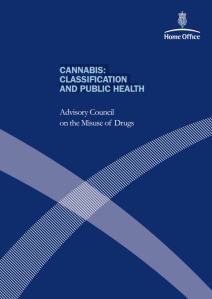 The basis for the government’s dismissal of the petition is given as the Advisory Council on the Misuse of Drugs (ACMD) 2008 report ‘Cannabis: Classification and Public Health’.
The basis for the government’s dismissal of the petition is given as the Advisory Council on the Misuse of Drugs (ACMD) 2008 report ‘Cannabis: Classification and Public Health’.
In the covering letter to the report, the then chair of the ACMD does say “… the use of cannabis is a significant public health issue. Cannabis can unquestionably cause harm to individuals and society.”
Judge for yourself whether the evidence in the report supports the idea that cannabis is a “significant public health issue”. I don’t think it does and nowhere in the report is such an unequivocal statement made except in the covering letter. Of course it is true that cannabis can cause harm to individuals, just as digestive biscuits, chips and sugary drinks can, so that’s pretty meaningless. There is no evidence in the report at all of cannabis causing harm to society.
But the covering letter then makes the point very strongly that “strategies designed to minimise its use and adverse effects must be predominantly public health ones. Criminal justice measures – irrespective of classification – will have only a limited effect on usage.”
The report recommends that cannabis remain in class C of the Misuse of Drugs Act 1971 but the government of the day, led by Gordon ‘Skunk is Lethal’ Brown, ignored that and increased it to class B.
Read the report yourself. Compare it with the government’s response to the petition. To claim that the report supports present policy is false. It directly contradicts present policy. There is also now a host of high quality evidence on the reality of decriminalised or regulated cannabis markets from the Netherlands, Portugal, Colorado and Washington. This shows beyond any doubt that the government’s suggestions of “drug dependence… misery… increased misuse” have no basis in evidence at all. Furthermore the idea that new tax revenue would be outweighed by new costs is directly contradicted by every study on the subject. I repeat, the government’s response is a pack of lies
Sadly, the United Kingdom is a country where government ministers are prepared to lie, mislead, distort evidence and deceive the British people in order to maintain policies based on prejudice and the corrupt influence of vested interests.
Cameron On Cannabis Part 6
 Cameron On Cannabis Part 5 is here.
Cameron On Cannabis Part 5 is here.
David Cameron’s mistakes about university places, immigration and cannabis have been on my mind over the Easter holiday. Given the huge resources he has to ensure that his information is correct, it’s not really acceptable for our prime minister to be so error prone. If the problem is that his attempts at spin are not working and he’s deliberately telling untruths but being caught out, well perhaps that’s even more worrying.
Whichever may be the case, and I’m ready to give Mr Cameron the benefit of the doubt about his sincerity, we are entitled to call him to account. I decided to give him another prod about the errors and mistakes he’s making about cannabis.
Dear Mr Cameron,
I refer to my last letter of 5th April 2011.
The statements you made about cannabis in your Al Jazeera YouTube interview were inaccurate and misleading. Please will you now correct them?
“Incredibly damaging…very, very toxic…leads to, in many cases, huge mental health problems”
This is simply not true Mr Cameron. Professor Les Iversen, chair of the ACMD, your chief drugs advisor, is on the record, repeatedly, stating that cannabis is very, very low in toxicity and relatively safe. Furthermore, all the experts agree that the risks to mental health are very, very small, certainly much less than alcohol or tobacco.
On the medicinal use of cannabis you said:
“…the science and medical authorities…are free to make independent determinations about that.”
This is also untrue Mr Cameron. The Home Office stands obstinately in the way of medicinal use despite overwhelming, peer reviewed scientific evidence. It denies the relief of a safe and inexpensive medicine to thousands who are trapped in pain, suffering and disability. This is a cruel policy and a disgraceful shame on our nation.
Please will you now correct these untruths Mr Cameron? They were your words. You were not advised by the Home Office. CLEAR represents the interests of at least six million regular users of cannabis in Britain, thousands of whom use it as medicine. We are reasonable, responsible, respectable citizens and taxpayers and we are entitled to insist that our prime minister speaks the truth
Recently, you also spoke misleading words about cannabis and mental health on “Jamie’s Dream School” and you said that “…if you legalise drugs you will make them even more prevalent than they are”, yet this too is contradicted by all the evidence in Portugal, Holland and the USA. Even the No 10 Strategy Unit Drugs Policy Project reported in 2003 that “There is no causal relationship between availability and incidence…problematic drug use is not driven by changes in availability or price.”
This time though you were talking directly to young people, those who your government says it is most important to send the correct message to. Mr Cameron, the only message that government consistently sends to young people is that it does not tell them the truth about drugs.
Please Mr Cameron, we are entitled to expect that you tell the truth and that you correct errors when they are made. These statements were not matters of opinion nor of interpretation, They are determined by scientific evidence. Will you please now correct them?
Yours sincerely,
Peter Reynolds
Home Office Drug Strategy Blog – Brokenshire The Buffoon
 James Brokenshire introduces the new Home Office drug strategy blog here.
James Brokenshire introduces the new Home Office drug strategy blog here.
It is difficult to contain the contempt in which I hold this odious and dishonest little man. His brazen cheek in believing that he has anything of honour or relevance to publish on the internet is astounding. Is he really so isolated in his ivory tower that he doen’t realise how much he and his polices are despised and reviled? Does he not know that he is subject to intense ridicule and disrespect at his absurd ideas and propaganda? Doesn’t he know that he is universally regarded as a complete prat – by all his colleagues, doctors, scientists, members of the ACMD, everyone who comes into contact with him?
This is my comment. I did my best to restrain myself and stay polite. I wonder whether it will be published?
There are many, many things wrong with Britain’s drug strategy. We now have one of the most regressive, authoritarian and oppressive drug policies anywhere in the world. Only in places where they execute people for drug possession such as Malaysia or China are there more backwards, unjust and outdated ideas being implemented.
No omission or error is more heinous though than the failure even to mention the medicinal use of cannabis. With the new understanding of the endocannabinoid system and its vital importance to all aspects of human physiology, the power of cannabis as medicine is self-evident. Throughout Europe, doctors are able to prescribe medicinal cannabis to patients. Extraordinary results are achieved in multiple sclerosis, neuropathic pain, Crohn’s, cancer, ADHD and many other conditions. Meanwhile the British government continues with what can only be described as its inane response that “there are no medicinal benefits in cannabis”. It is not just a stupid policy. It is cruel. Hundreds of thousands of British citizens are denied access to the medicine that could relieve their pain and suffering. Meanwhile, in virtually every other country in Europe except France, in Israel and in 15 US states, cannabis is being used as medicine and achieving wonderful results.
Those denied their medicine in Britain are humiliated that European patients can bring medicinal cannabis into Britain and use it under the protection of the Schengen Agreement. This is a cruel and unusual punishment for the crime of being resident in Britain.
The British drug strategy is a joke throughout the world except amongst those agencies and drug workers that depend upon it for their living. It is a shame on our great nation and an extreme indictment of our political system which allows such discredited, cruel and self-defeating policies to persist.
The prohibition of medicinal cannabis is perhaps the best example of how utterly useless, out of date and hopeless is current government drugs policy.
Legal Opportunities For Medicinal Cannabis Users
Recent developments mean that there are new opportunities to challenge the prohibition of cannabis as medicine. Now I am not a lawyer, so these ideas should be carefully discussed with your legal advisors before you even consider pursuing any of them. I may be wrong about the correct procedure, process or terminology. I am highlighting opportunities that I have identified, based on my personal experience and knowledge. Qualified legal advice is essential.
The British government’s current position on medicinal cannabis is absurd and irrational. As I understand it, those are exactly the criteria for which the process of judicial review is intended. That is one route. Another, more risky opportunity arises if you are facing prosecution or have been convicted of an offence of possession, cultivation or production. There are ideas here which you may want to consider as a defence or an appeal. However, please be very careful. If things go wrong, advancing such arguments might result in a heavier sentence, such is the cruel, oppressive and iniquitous intent of current government policy.
The Home Office is simply dishonest in its current stance saying that there “are no medicinal benefits” from cannabis. James Brokenshire, the drugs minister, cannot hide behind a lack of knowledge so he looks either more stupid or dishonest every day. David Cameron made the most dreadful, disingenuous comment about medicinal use in his Al Jazeera World View YouTube interview last week. See here. He said “That is a matter for the science and medical authorities to determine and they are free to make independent determinations about that.” That, of course, is absolute rot and Cameron should be ashamed of himself for such misinformation.
Obtain A Doctor’s Prescription For Medicinal Cannabis
There is nothing to prevent your British doctor from prescribing medicinal cannabis for you if he/she believes it is appropriate. Bedrocan BV is the official contractor to the Dutch government for the production of medicinal cannabis. Go to its website here and you will discover it has a range of products offering different proportions of cannabinoids and terpenoids for different conditions. Prescribing information is available for your doctor in exactly the same way as any other drug. All he/she has to do is select the product and write out a prescription in the normal way. Your doctor can’t get in trouble for this. There is nothing improper or unethical about it, but it is, of course, your doctor’s decision whether to do so or not.
 If your doctor isn’t prepared to help, the next best thing is to go to a doctor in Holland, Belgium, Germany, Spain or Italy, all countries where medicinal cannabis is regularly prescribed. In theory, you should be able to see a doctor in another EU country under reciprocal healthcare arrangements but if you can afford it, it may be simpler to go privately.
If your doctor isn’t prepared to help, the next best thing is to go to a doctor in Holland, Belgium, Germany, Spain or Italy, all countries where medicinal cannabis is regularly prescribed. In theory, you should be able to see a doctor in another EU country under reciprocal healthcare arrangements but if you can afford it, it may be simpler to go privately.
Another option is to go to one of the 15 US states that permit medical marijuana and obtain a doctor’s recommendation.
Once you have your prescription, you need to apply to the Home Office for a personal import licence to bring your medicine in from Holland. The licensing section on the Home Office website is here. If you obtain a licence you will also need to go through a similar process with the Dutch Bureau voor Medicinale Cannabis to obtain an export licence. The correct section of its website is here.
Of course, the reality is that the Home Office is not going to grant you a licence. You can then pursue the matter through your MP who should make representations to the minister on your behalf. You are then at the point to make an application for judical review of the Home Office’s decision.
Challenge The Government’s Interpretation Of The Schengen Agreement
The Schengen Agreement provides protection for travellers to carry their medicine with them within the EU. The crucial factor is your country of residence. See here for detailed information. Although there is no precise definition of residency, if you are resident in an EU country where medicinal cannabis is permitted, then you may bring your medicine into Britain and, believe it or not, there is no restriction on your use of it. You would be perfectly entitled to sit on the steps of Scotland Yard or even the Home Office’s Marsham Street HQ and smoke a spliff. However, if you are a UK resident, even if you have obtained your medicine on prescription abroad, you are not protected. This is clearly discriminatory under EU law and could be challenged in court. I’m not certain whether you would apply to a British court or to the European court but your solicitor would advise you on this.
Defence Or Appeal On The Grounds Of Medical Necessity
The Appeal Court disallowed a defence of medical necessity back in 2005. A petition to the House Of Lords Judicial Committee and to the European Court Of Human Rights was dismissed without any reasons given. I understand that the Appeal Court’s reasoning was that there were no proven medicinal benefits of cannabis. However, things have changed enormously since then. The MHRA approval of Sativex and the Home Office’s issue of a general licence for it are conclusive proof of medicinal value. Whatever misinformation the Home Office may promote, expert evidence would prove that Sativex is pharmacologically identical to, for instance, one of the Bedrocan products. There is also now a vast resource of peer-reviewed clinical evidence of medicinal benefits.
There is an horrendously improper judgement (R -v- David King, St Albans Crown Court), where a medicinal user was not allowed even to mention medicinal reasons to a jury on pain of imprisonment for contempt. Your lawyers would need to study this carefully. However, it is so clearly unjust that I do not believe it could be sustained.
Sativex is currently a schedule 1 controlled drug which means it has no medicinal value. As mentioned earlier, the Home Office has dealt with this temporarily by issuing a general licence for it. However, it needs to be re-scheduled and the Advisory Council On the Misuse of Drugs (ACMD) has recommended that it be placed in schedule 4. See here for the full story.
Sativex cannot be re-scheduled under its brand name and the only pharmacologically accurate way of describing it is cannabis. The ACMD left a possible escape route for the Home Office by saying that its “active” ingredients would have to be specified. GW Pharma, the makers of Sativex would say that this means an extract of THC and CBD. However, this is dishonest. Sativex contains all the 60-odd cannabinoids that occur naturally in the plant. There is no other way of describing it accurately than to call it cannabis. If Brokenshire and his cronies try to prolong this deception then they can be challenged by judicial review. The aim here is to ensure that the re-scheduling is accurate and so cannabis becomes a schedule 4 drug. This would then open up all opportunities for cannabis as medicine.
I have no doubt now that medicinal cannabis will be permitted in some form or another in Britain within the near future. We may need to force the government’s hand through litigation or, perhaps Brokenshire will be moved to another department and then the Home Office can “adjust” its position.
At present, it is a monstrous injustice, an evil and obscene scandal, that those who need cannabis as medicine are denied it. The way of politics is that a few years from now it may well all have changed and Brokenshire will be at the Ministry of Silly Walks or somewhere better suited to his talents. However it works out, what I care about is that those in pain and suffering get the relief they need. One day soon, Brokenshire will have to answer to his constituents and later to an even higher power. How he will justify his cruelty and negilgence I don’t really care but I know I wouldn’t want to be in his shoes on judgement day.
Bringing Cannabis Back Into The Medicine Cabinet
Professor Les Iversen delivers the Inaugural President’s Public Lecture during the BPS Winter Meeting, London 2010.
Prof. Iversen is the current chairman of the Advisory Council on the Misuse of Drugs and a founder council member of the British Medicinal Cannabis Register. He is also the author of many publications and books on cannabis. He is famous for his article in The Times headlined “Cannabis. Why It’s Safe” and for saying that cannabis is “one of the safer recreational drugs”.
He walks a courageous and tricky tightrope between science and his ACMD role. He is the government’s chief drug adviser so at least we know they are getting good advice even if they don’t act on it.
You can watch the lecture here.
Professor Iversen has also provided me with a copy of his Powerpoint presentation from the lecture which you can download here.
PM MP
By Jason Reed
To all that support change in current policy, I invite you to take part in: PM MP.
What is PM MP? Well, I am hosting a letter that I am encouraging as many people as possible to post one copy to the Prime Minister, and one copy to your MP. It is through weight and numbers that points are grasped and policy changed.
It is also worth sending to the Home Secretary – Theresa May, and James Brokenshire – Minister for Crime Prevention at the Home Office.
If you would like to add your name and address so as to receive a reply, all the better. If you wish to remain anonymous, then that’s also fine, but please do take the time to send just two letters to the Prime Minister and your MP at this address:
Prime Minister,
10 Downing Street,
London, SW1A 2AA
Your MP can be found here:
And your MP’s address will be:
MP’s NAME, or James Brokenshire, or The Home Secretary Theresa May
House of Commons,
London SW1A OAA
Below you can find the template letter that has been created to address the current law & policy that surrounds cannabis in Britain. It is with a great deal of thanks to the Drug Equality Alliance for directing the wording to address this issue correctly.
Please do support this; please send the letters. Fellow bloggers, please also host the letter and send forth.
Either copy & paste the below text into a letter, or I have provided downloadable links at the end of this blog post. Thank you all. Jason.
Dear
I am writing to state my view that continuing prohibition of all private interests in cannabis is not in the best interest of society or the individual. Current policy is in many regards counter-productive and a drain on the country’s resources. The administration of Misuse of Drugs Act 1971 is mandated to be under constant review & evidence based; it’s concern is solely to reduce social harm caused by drug misuse. I submit that there can be no justification in law for the blanket ban on accessing a substance that many persons use responsibly, and many use to experience the amelioration of symptoms caused by various medical disorders.
The Misuse of Drugs Act 1971 seeks to regulate human action re any harmful drug, it does not provide a mandate for prohibition, indeed when one examines the obligations of the ACMD one can see that the law seeks to make arrangements for the supply of controlled drugs. The legislative aim is to control responsible human action and property interests through the regulation of the production, distribution and possession of any harmful drug; this being proportionate and targeted to address the mischief of social harm occasioned by misuse. I note that the law does not prohibit the use of cannabis at all, and this often ignored fact was Parliament’s way of opening the door to facilitate a suitable and rational regulatory structure. I place it on record that I wish the Misuse of Drugs Act 1971 to be used properly, and neutrally; specifically; (under Section 1) – “(2) (a) for restricting the availability of such drugs or supervising the arrangements for their supply.”
The prohibition of all private interests in cannabis & the denial of the possibility of responsible use has failed:
- The estimated expenditure of £19 billion on the judicial ‘controls’ over UK drug policy is a large sum that cannot be justified in the current fiscal climate. I do not believe it can be proven to be a valid policy even if the nation could easily afford it; it has a high price on liberty, and a paradoxical effect upon the health of all drug users – it has proved futile in almost every way, save for the government’s blind adherence to the international treaties it chooses to fetter it’s discretion to.
- There is an estimated street value of £5 billion profit going directly to gangs and cartels, and this in turn funds organised crime, human trafficking, and all manner of hard-line criminality.
- Children have easy & ready access to cannabis. Children are dealing cannabis and using cannabis with relative ease.
- There is an estimated 165 million responsible and non-problematic cannabis users worldwide. There is anything from 2 – 10 million adult users in the UK. There is no societal benefit to criminalising such a large portion of society, these are generally law-abiding persons who wish to use a substance that is comparatively safer than many drugs that government choose to exclude users of from the operation of the MoDA 1971 (despite the Act being neutral as to what drug misusers are controlled, the most harmful drugs such as alcohol and tobacco are excluded by policy, but this is not reflected in the Act itself).
- Under prohibition, as in 1920’s America, quality control has suffered giving way to hastily harvested cannabis which acts as the modern day equivalent of the infamous Moonshine & Hooch. The UK media terms this bad product simply as “Skunk”. Cannabis is now being cut with harmful drugs, glass, metal fillings, and chemicals to give false potency, and to add weight for profit motivations.
- To criminalise personal actions that do not harm others within the confines of privately owned property is at best draconian, and at worst futile & irresponsible.
I wish to encourage the adoption of a regulatory system that provides:
- An age-check system to prevent the young and vulnerable from obtaining cannabis with the ease they currently have.
- The partial saving from the £19 billion drug enforcement budget, alongside the estimated street worth of £5 billion potentially collected from cannabis. This would be a considerable sum in aiding the country in fiscal crisis.
- Quality control that can be accorded to cannabis production and sale, thus ensuring that there are no dangerous impurities and that the correct balance of cannabinoids are present (according to the needs of the user) to minimise potential harms.
- Potency & harm reduction information can be provided to adults, ensuring education is the forefront of the regulatory model.
- A restriction on marketing and the creation of designated discreet outlets. As seen in many countries, given a place of legitimacy, the cache of cannabis is lessened in favour of responsibility.
- The freedoms and rights for non-problematic users to be respected.
I do hope that you will give this matter the urgent attention it warrants.
Yours
Cannabis Embarrassment At The Home Office
 The re-scheduling of Sativex, the cannabis tincture marketed by GW Pharmaceuticals is causing huge embarrassment at the Home Office.
The re-scheduling of Sativex, the cannabis tincture marketed by GW Pharmaceuticals is causing huge embarrassment at the Home Office.
Everybody’s been able to go along with the white lie up to now that Sativex is some sort of highly complex, super scientific, super medicine containing cannabinoids. True enough, GW Pharma has put millions into development and testing in order to jump through the hoops the government has demanded. At the end of the day though, all Sativex consists of is a tincture, an alcohol extract of herbal cannabis. It’s made simply by gently heating a blend of herbal cannabis in ethanol and then adding a little peppermint oil to taste.
The Medicines and Healthcare Products Regulatory Agency (MHRA) has approved Sativex for the treatment of muscle spasticity in MS. I understand that an approval for the treatment of cancer pain is expected shortly. The problem for the Home Office is that Sativex now has to be re-scheduled under the Misuse of Drugs Act 1971. Cannabis is presently in schedule one as having no medicinal value. The Advisory Council on the Misuse of Drugs (ACMD) has recommended this week that Sativex be in schedule four, alongside a variety of minor tranquilisers. However, as the ACMD says, “it will not be appropriate to refer to “Sativex”, which is a proprietary name, in any amendment to the misuse of drugs regulations, and that a suitable description of the relevant component(s) of “Sativex” will have to be scheduled.”
This is going to be tough for James Brokenshire to face up to. GW specifies that Sativex contains approximately equal proportions of THC and CBD but that’s not the whole truth. It also contains as many as 400 other chemical compounds which occur naturally in the plant including at least 85 cannabinoids (nobody is exactly sure how many cannabinoids there are or their effects). You see there’s not really any other accurate way of describing Sativex except to call it cannabis. So how can Mr Brokenshire possibly move it to schedule four? He endlessly repeats the propaganda that “there are no medicinal benefits in cannabis”.
Either Mr Brokenshire has to come clean and accept that his past position was incorrect or he has to promote some further deception.
I trust he will prove to be an honourable man.


